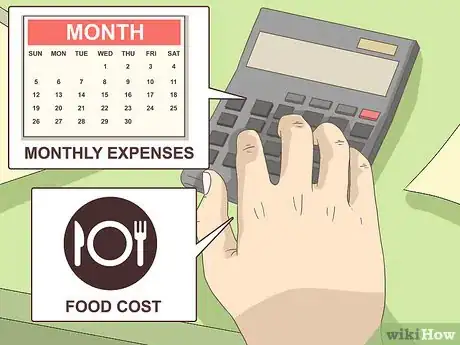This article was co-authored by Andrew Lokenauth. Andrew Lokenauth is a Finance Executive who has over 15 years of experience working on Wall St. and in Tech & Start-ups. Andrew helps management teams translate their financials into actionable business decisions. He has held positions at Goldman Sachs, Citi, and JPMorgan Asset Management. He is the founder of Fluent in Finance, a firm that provides resources to help others learn to build wealth, understand the importance of investing, create a healthy budget, strategize debt pay-off, develop a retirement roadmap, and create a personalized investing plan. His insights have been quoted in Forbes, TIME, Business Insider, Nasdaq, Yahoo Finance, BankRate, and U.S. News. Andrew has a Bachelor of Business Administration Degree (BBA), Accounting and Finance from Pace University.
There are 13 references cited in this article, which can be found at the bottom of the page.
This article has been viewed 19,145 times.
Being financially prepared to live on your own can seem like an overwhelming process. Luckily, we can help you get prepared so you'll feel confident and ready when the time comes!
Steps
Setting a Budget
-
1Determine your net income. If you make a salary or otherwise make a regular income, it’s fairly easy to determine your net earnings. Just multiply your regular paycheck after taxes by 26 if you get paid biweekly or by 52 if you get paid weekly. If your income varies week to week, average your earnings after taxes over the course of the last year.[1]
- If you want to make a more conservative estimate, use your lowest monthly income during the last year to set your budget.
-
2Plan on spending at least half of your income on rent and utilities. You should spend no more than 20 to 30 percent of your income on rent or mortgage.[2] Plan on spending at least another 20 percent on utilities, like electricity, water, heating, and cooling.[3]
- For example, if you make $4,000 (U.S.) per month, you should cap your rental budget at around $1,200.
- If you live with your parents, ask them about their utility expenses to get a feel for your projected costs.
Advertisement -
3Calculate your food costs, cell phone bill, and other monthly expenses.[4] Take note of the costs of your cell phone bill, auto payment, and other fixed expenses. Other than downsizing your cell phone plan, you don’t really have much room to negotiate these expenses. Food, on the other hand, is a more flexible part of your budget.[5]
- Try to budget about 30 percent of your budget for these expenses.
- It's important to take a look at your last 12 months of bank statements and credit card statements to really understand your fixed and variable expenses. Without doing that, it will be impossible to budget and financially prepare yourself.[6]
-
4Don’t forget to pay off debt.[7] Having a good credit score is vital to renting or buying a place to live. If you have credit card or student loan debt, don’t forget to budget for your payment.[8] [9]
- Try to budget about 10 percent of your income for debt repayment. If necessary, try calling your loan servicer to arrange an income-based payment plan.
-
5Try to save at least 30 percent of your income.[10] Do your best to adjust your budget to make some room for savings. You’ll want to establish a cushion in case of emergencies, from medical issues to job loss.[11]
- Fitting room in your budget for savings might be impossible immediately after setting out on your own. You’ll likely be spread thin due to moving fees, furnishing your new place, and buying incidentals, from baking soda to pots and pans. Set a goal to start saving within three months of moving.
- Budgeting for saving is important in the case of loss of income, so you can keep yourself afloat for a while. Make sure to take your rent, your food, utilities, shelter into account when budgeting.[12]
-
6Use a budgeting app. If you’re an Excel wiz, you can create your own spreadsheet to calculate your costs and adjust them to your net income. However, the easiest way to go is to use a tool like Mint or You Need a Budget.[13] [14]
- Adjust your numbers if necessary so you know you earn more than your planned budget. For example, decrease your projected food costs by $50 if you need a little wiggle room.
- Create your budget based on realistic expectations so you'll be more likely to stick with it.[15]
-
7Spend wisely and with discipline. Once you’ve set your budget, stick to it. Don’t be tempted to splurge on nights on the town or a new gadget. Cultivate discipline and perseverance, and remind yourself that being financially independent is more important than an unwise purchase.[16]
- If you find yourself spending more in a certain category, like dining out, evaluate how important that expense is to your life. If it's really meaningful, plan for that expense but decrease spending in other areas.[17]
Planning New Living Arrangements
-
1Avoid trying to reconstruct your current life. As you prepare for your new living arrangements, get used to the thought of downsizing and living without some of the comforts you might take for granted. From setting a budget to finding a place of your own, accepting that your lifestyle must change is the most essential lesson to learn.[18]
- If you live with your parents, prepare yourself to give up having cable with 300 channels, a washing machine, dryer, dishwasher, and a spacious house.
- If you’re used to having roommates, prepare to cut your spending on entertainment and going out drastically so you can afford to live alone.
-
2Save for a security deposit, rental bond, and other fees. Finding a place to live costs more than just your first month’s rent, so be sure to save up for at least a few months. Depending on your location, you’ll have to pay a security deposit or rental bond, which is typically equivalent to one month’s rent. In addition, even if you just rent a truck and have friends help you move in exchange for pizza, you’ll still have some degree of moving costs.[19]
- If you have a pet, you might have to pay a one time or recurring pet fee.
- If you’re planning on purchasing your new place, factor in your down payment, closing costs, inspection fees, legal fees, and the cost of moving your furniture.
-
3Look for an affordable place to live. Look on websites like Zillow for apartments or houses for rent in your budget. You can also search for property management companies in your area.[20]
- Toggle your search options so you only see places that you can afford. Get to know your area’s market and compare rents across various neighborhoods.
- Think about how one location might save you money in the long run. If an apartment is $100 more per month than another, but is walking distance to your job and near a public transit hub, think about how you might save money on gas or by getting rid of your car altogether.
-
4Consider relocating to a new city or town. If you live in a big city, look for places to rent that are outside of the urban center. Living in the heart of the city or in a more desirable neighborhood can cost two or three times as much as living in a suburb.[21]
- The cost of living in your city could also make it impossible to live alone, so do some research into the average annual income required to live comfortably in your area. For example, if your city’s average cost of living demands an annual income twice as much as your earnings, consider relocating to a more affordable city.[22]
-
5Downsize if your partner or roommate is moving. If your domestic partner or roommate announces that they’re moving out, figure out if you can cut your non-housing bills and stay in your current home. If you can’t afford it, find a smaller place. It’s better to downsize to a studio or one bedroom than struggle to make ends meet in a two bedroom.[23]
- If you love your location and live in an apartment complex, ask your property manager if any smaller apartments are available.
- Make sure you and your roommate meet the terms of your lease, or you’ll risk losing your security deposit.
-
6Use discretion if you’re ending a relationship. If you’re preparing to live alone because you’re ending a relationship, think about how your soon-to-be ex will react. Ideally, you can discuss your situation rationally, and strategize your break-up in a way that leaves you both financially stable.
- However, if you believe they’ll try to make it financially impossible for you to move, open a new bank account in your name, use the account to save money for your move, and delete your browsing history after searching for a new place to live.[24]
Cutting Your Costs
-
1Look for Internet deals. Cutting cable is one thing, but ditching the Internet can be impossible, especially if you need to complete assignments at home for work or school. Shop around for deals and discounts, like bundling services.[25]
- See if your cell phone provider offers Internet services in your area and if you can bundle phone and Internet.
- Avoid being tempted to bundle unnecessary services. Suppose a base Internet plan costs about $30 a month, but you can upgrade to Internet plus basic cable for $50 a month. Think about how that $20 could be spent elsewhere before going for the bundle upgrade.
- If you can't afford Internet or want to cut services to save money, try looking for free wi-fi spots in your area. Hang out at your local library or consider checking out a nearby coffee shop. Keep track of how much you spend on coffee, however, because that could easily add up to the cost of a monthly Internet bill.
-
2Find affordable secondhand furniture and household goods. Save money on furnishing by shopping at estate sales, yard sales, consignment shops, and on Craigslist. Let your friends and family know that you’re on the hunt for gently used furniture and other household goods.[26]
- Make sure to ask around your social circle for free stuff before spending any money. Chances are, someone will be looking to unload excess furniture and household goods.
- Stocking and furnishing a new home is full of unanticipated costs, from lamps, dishware, and cookware to spices and cleaning supplies. Save where you can by going with used items and hand-me-downs. If anyone asks what you want for a housewarming gift, ask for household necessities.
-
3Buy and prepare food in bulk. Buy grains, canned foods, pastas, and other non-perishable items in bulk to cut your food budget in the long run. Cooking one large meal and freezing portions will cut down on the amount of time your stove is in use and help you cut your electricity or gas bills.[27]
- Use coupons and stock up on items on sale, as long as they won’t spoil or go to waste.
- Take a thorough inventory before you go shopping, make a list, and avoid impulse purchases at the grocery store.
-
4Cut down on using appliances. If you don’t have your own dryer, consider how quickly spending $1.50 on each load of clothes at the laundromat adds up. Being frugal with appliance use might seem tedious, but your savings will add up over the course of the year.[28]
- Hang your clothes to dry, avoid leaving your refrigerator open longer than necessary, avoid leaving the television on, and do your best to keep your heating and cooling costs to a minimum.
-
5Borrow money from family or friends. If you elect to take a loan from someone close to you, you should take some precautions to protect both parties. Make a payment plan and, if your lender wants you to pay interest, agree to a rate. Put the date and amount of the loan, payment plan, and interest rate in writing and have both parties sign.[29]
- You should treat a loan as a business interaction, not as something personal. Try to separate the loan from your personal relationship with your lender.
- If the loan is sizable, like in the range of several thousand dollars, having the terms of the loan in writing will help you demonstrate that it's in fact a loan and not a gift. If you're audited or garnished come tax time, you'd have to prove that the money you received wasn't a gift, which would incur tax liability.
References
- ↑ http://www.moneycrashers.com/how-to-make-a-budget/
- ↑ https://www.census.gov/housing/census/publications/who-can-afford.pdf
- ↑ http://www.moneytalksnews.com/done-with-roommates-48-ways-afford-living-solo/?all=1
- ↑ Andrew Lokenauth. Finance Executive. Expert Interview. 15 November 2022.
- ↑ http://www.moneycrashers.com/how-to-make-a-budget/
- ↑ Andrew Lokenauth. Finance Executive. Expert Interview. 15 November 2022.
- ↑ Andrew Lokenauth. Finance Executive. Expert Interview. 15 November 2022.
- ↑ Samantha Gorelick, CFP®. Financial Planner. Expert Interview. 6 May 2020.
- ↑ http://www.moneycrashers.com/moving-out-parents-house/
- ↑ Andrew Lokenauth. Finance Executive. Expert Interview. 15 November 2022.
- ↑ http://www.moneycrashers.com/moving-out-parents-house/
- ↑ Andrew Lokenauth. Finance Executive. Expert Interview. 15 November 2022.
- ↑ Samantha Gorelick, CFP®. Financial Planner. Expert Interview. 6 May 2020.
- ↑ http://www.moneycrashers.com/how-to-make-a-budget/
- ↑ Samantha Gorelick, CFP®. Financial Planner. Expert Interview. 6 May 2020.
- ↑ http://www.moneycrashers.com/becoming-wealthy-is-like-becoming-an-olympic-athlete/
- ↑ Samantha Gorelick, CFP®. Financial Planner. Expert Interview. 6 May 2020.
- ↑ https://www.moneymanagement.org/Community/Blogs/Blogging-for-Change/2015/October/Seven-Rules-for-Living-on-Your-Own.aspx
- ↑ http://www.realestate.com.au/advice/a-first-timers-guide-to-moving-out-on-your-own/
- ↑ http://www.moneycrashers.com/how-to-find-cheap-apartments-for-rent-guide/
- ↑ http://www.moneycrashers.com/how-to-find-cheap-apartments-for-rent-guide/
- ↑ Samantha Gorelick, CFP®. Financial Planner. Expert Interview. 6 May 2020.
- ↑ https://www.institutedfa.com/surviving-financially-after-divorce/
- ↑ http://time.com/money/3312968/whyistayed-prepare-financially-leave-abusive-relationship/
- ↑ http://www.moneytalksnews.com/done-with-roommates-48-ways-afford-living-solo/?all=1
- ↑ http://www.moneytalksnews.com/done-with-roommates-48-ways-afford-living-solo/?all=1
- ↑ https://www.moneymanagement.org/Community/Blogs/Blogging-for-Change/2015/October/Seven-Rules-for-Living-on-Your-Own.aspx
- ↑ http://www.moneytalksnews.com/done-with-roommates-48-ways-afford-living-solo/?all=1
- ↑ https://www.entrepreneur.com/article/24380













































































